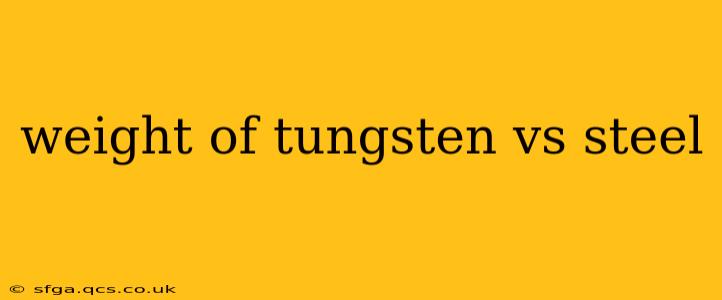Tungsten and steel are both incredibly strong metals with a wide range of applications, but their key difference lies in their density. This article will delve into a comprehensive comparison of tungsten and steel, exploring their weight differences, properties, and common uses. We'll also address some frequently asked questions to provide a complete understanding of these industrial workhorses.
What is the weight difference between tungsten and steel?
The most significant difference between tungsten and steel is their density. Tungsten is considerably denser than steel. Steel's density typically ranges from 7.75 to 8.05 g/cm³, while tungsten boasts a density of approximately 19.3 g/cm³. This means that a given volume of tungsten will weigh almost 2.5 times more than the same volume of steel. This density difference is crucial in determining their applications.
Why is tungsten so much heavier than steel?
Tungsten's exceptional density stems from its atomic structure and high atomic weight. Tungsten atoms are significantly heavier than the iron atoms that primarily compose steel. This inherent atomic weight difference directly translates to a much higher density. The arrangement of atoms in the tungsten crystal lattice also contributes to its density.
What are the applications of tungsten?
The high density and strength of tungsten make it ideal for various specialized applications:
- Military applications: Tungsten's density makes it a crucial component in projectiles, armor-piercing rounds, and counterweights.
- Medical applications: Tungsten is used in radiation shielding due to its ability to absorb X-rays and gamma rays. It's also found in some medical implants.
- Industrial applications: Tungsten's high melting point makes it suitable for high-temperature applications such as welding electrodes and furnace parts. It's also used in high-speed cutting tools.
What are the applications of steel?
Steel, while less dense than tungsten, is a highly versatile metal with a wide array of applications due to its strength, ductility, and relatively low cost:
- Construction: Steel is a foundational material in building construction, bridges, and skyscrapers.
- Automotive industry: Steel forms the chassis and body of most vehicles.
- Manufacturing: Steel is used extensively in various manufacturing processes, from tools to machinery.
- Household appliances: Many everyday household appliances, like refrigerators and washing machines, incorporate steel components.
What is the tensile strength of tungsten vs. steel?
While density is the primary difference, tensile strength is another important factor. Tungsten generally possesses higher tensile strength than most types of steel. However, the specific tensile strength depends on the alloying elements present in both tungsten and the type of steel in question. High-strength steel alloys can sometimes rival or even surpass certain tungsten alloys in terms of tensile strength in specific applications.
Is tungsten more expensive than steel?
Yes, tungsten is significantly more expensive than steel. This is due to the higher cost of tungsten extraction and processing compared to steel production. The rarity of tungsten compared to the readily available iron ore used to make steel also contributes to its higher price.
Which is stronger: tungsten or steel?
The question of which is "stronger" is complex and depends on the specific type of steel and tungsten alloy considered, and the type of strength being measured (e.g., tensile strength, compressive strength, hardness). While tungsten often boasts higher tensile strength and hardness, some high-strength steel alloys can outperform certain tungsten alloys in specific applications. However, for applications requiring extreme density, tungsten is clearly superior.
This comparison highlights the unique properties and applications of tungsten and steel. While steel remains a versatile and widely used metal, tungsten’s high density and strength make it indispensable for specialized applications where weight and density are critical factors.
